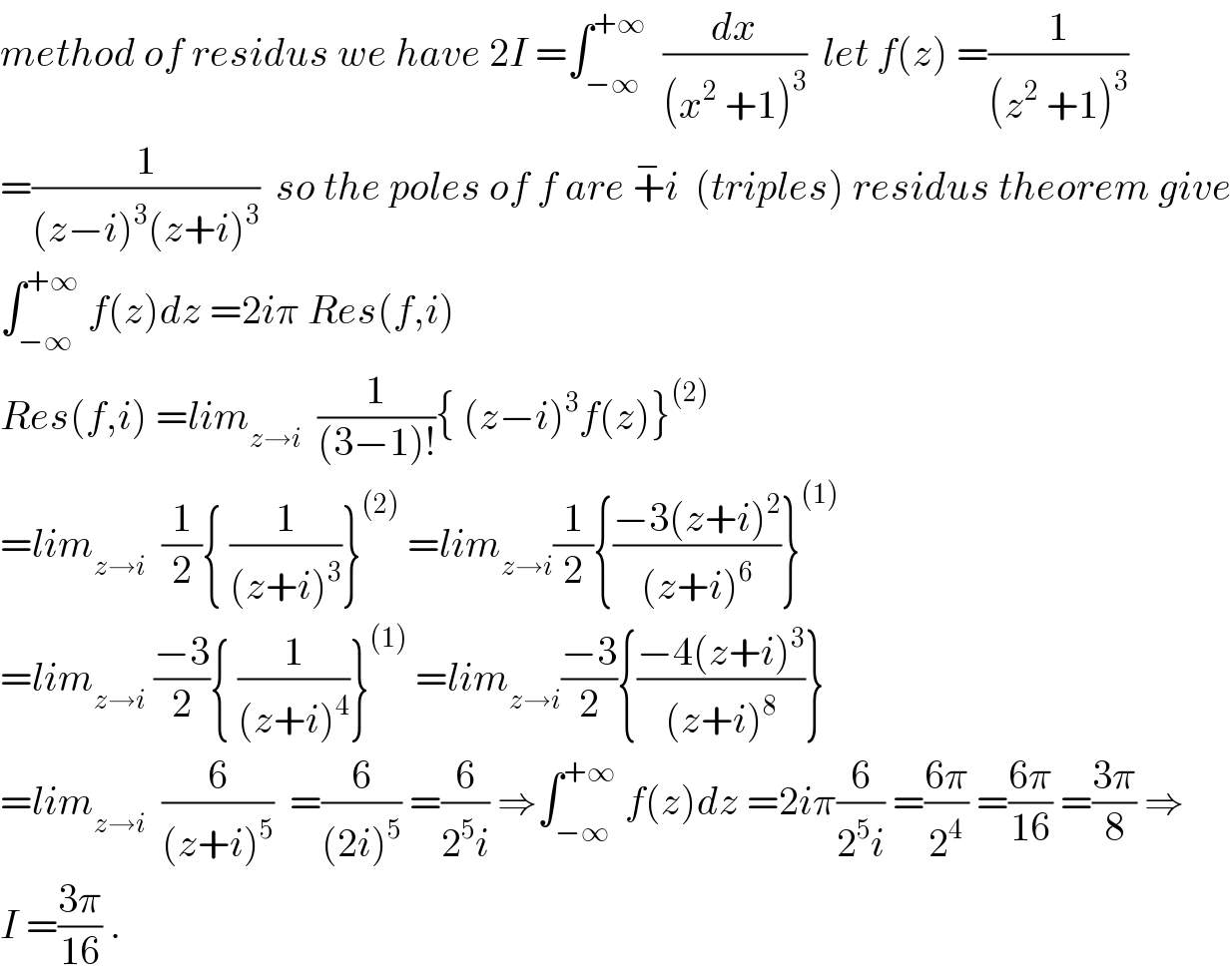
Question and Answers Forum
Question Number 58770 by Mr X pcx last updated on 29/Apr/19

Commented by maxmathsup by imad last updated on 15/May/19

Answered by tanmay last updated on 30/Apr/19

Commented by Mr X pcx last updated on 30/Apr/19

Commented by tanmay last updated on 30/Apr/19

Answered by Smail last updated on 30/Apr/19
![A_n =∫_0 ^∞ (dx/((x^2 +1)^n )) let x=tant⇒dx=(1+tan^2 t)dt A_n =∫_0 ^(π/2) ((1+tan^2 t)/((1+tan^2 t)^n ))dt=∫_0 ^(π/2) (dt/((1+tan^2 t)^(n−1) )) =∫_0 ^(π/2) cos^(2(n−1)) tdt=∫_0 ^(π/2) (1−sin^2 t)cos^(2n−4) tdt =∫_0 ^(π/2) cos^(2(n−2)) tdt−∫_0 ^(π/2) sintsintcos^(2n−4) tdt =A_(n−1) −∫_0 ^(π/2) sint×((d(−cos^(2n−3) t))/((2n−3))) =A_(n−1) +[(1/(2n−3))sint×cos^(2n−3) t]_0 ^(π/2) −∫_0 ^(π/2) cost×((cos^(2n−3) t)/(2n−3))dt =A_(n−1) −(A_n /(2n−3)) A_n =((2n−3)/(2(n−1)))A_(n−1) =((2n−3)/(2(n−1)))(((2n−5)/(2(n−2)))A_(n−2) ) ... A_n =(((2(n−1)−1)(2(n−2)−1)...(2(n−(n−1))−1))/(2^(n−1) (n−1)(n−2)...(n−(n−1))))A_(n−(n−1)) =(((2n−3)(2n−4)(2n−5)(2n−6)...1)/(2^(n−1) (n−1)!×(2n−4)(2n−6)...2))A_1 =(((2n−3)!)/(2^(n−1) (n−1)!×2^(n−2) (n−2)!))∫_0 ^(π/2) dt =(((2n−3)!)/(2^(2n−3) (n−1)((n−2)!)^2 ))×(π/2) A_n =((π(n−1)(2n−3)!)/(2^(2n−2) ((n−1)!)^2 )) For n=3 A_3 =I=∫_0 ^∞ (dx/((x^2 +1)^3 ))=((π(3−1)(6−3)!)/(2^(6−2) ((3−1)!)^2 ))=((3π)/(16)) For n=5 A_5 =J=∫_0 ^∞ (dx/((x^2 +1)^5 ))=((π(5−1)(10−3)!)/(2^(10−2) ((5−1)!)^2 )) =((7!π)/(2^(12) ×3^2 ))=((7×5π)/2^8 )=((35π)/(256))](Q58788.png)
Commented by Mr X pcx last updated on 30/Apr/19

